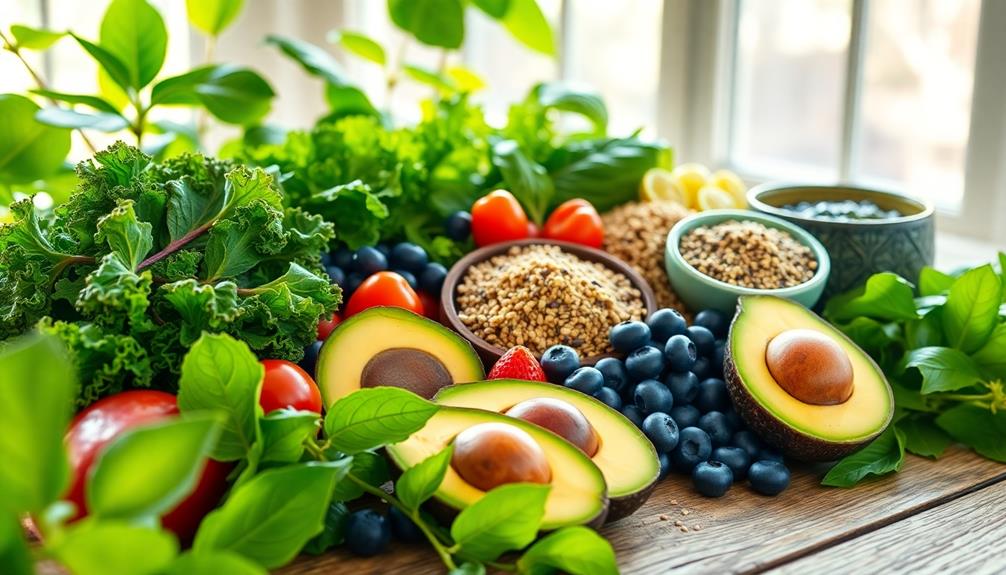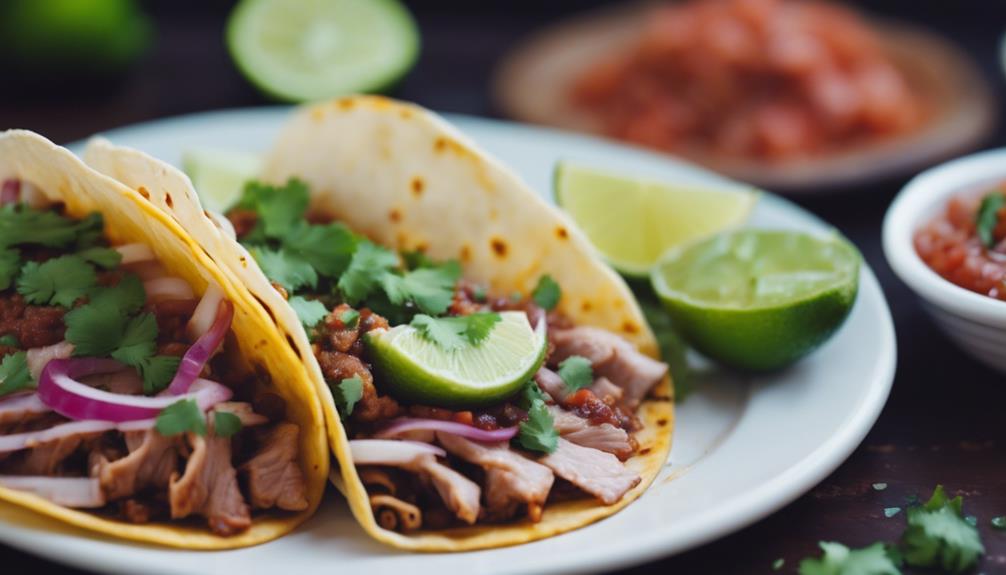When you compare organic and conventional produce, you'll notice important differences in farming methods and health benefits. Organic foods have lower pesticide residues and often support sustainable practices that enhance soil health and biodiversity. While some studies suggest minor nutritional advantages, overall health outcomes haven't been conclusively better just because a food is organic. It's crucial to know that labels can be misleading; always look for the USDA Organic seal to verify the product meets strict standards. Understanding these factors can help you make informed choices about your food. There's much more to uncover on this topic as you explore further.
Key Takeaways
- Organic produce has lower pesticide residues, making it a safer choice for health-conscious consumers compared to conventional options.
- USDA organic certification ensures products meet strict guidelines, while terms like "natural" may be misleading.
- Organic farming practices promote soil health, biodiversity, and sustainable ecosystems, reducing environmental impact.
- Nutritional differences between organic and conventional foods are minimal, with health benefits largely stemming from overall eating patterns.
- Consumer preferences for organic foods reflect growing concerns about food quality, health, and environmental sustainability.
Understanding Organic Certification
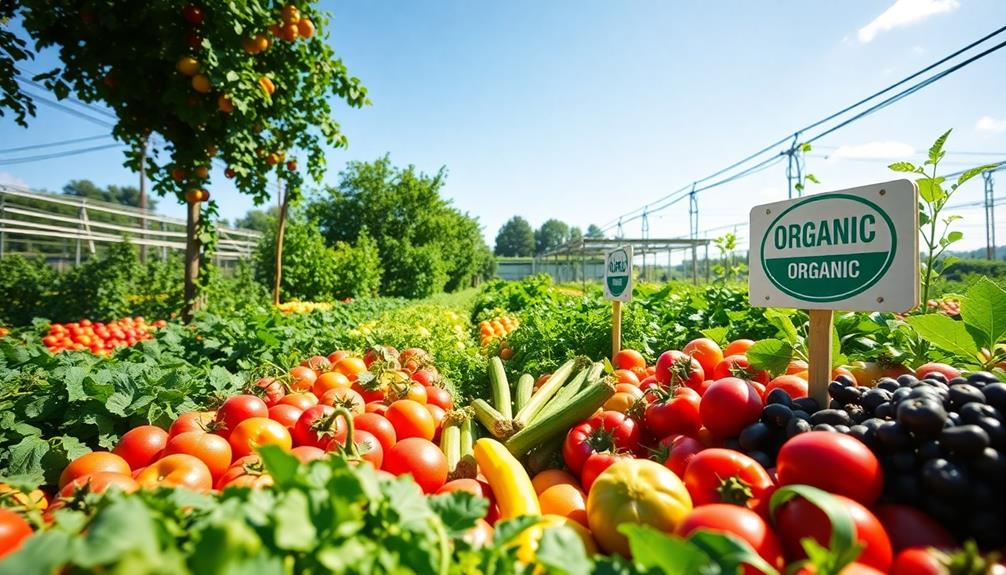
When it comes to understanding organic certification, it's essential to know that the USDA tightly regulates this process to guarantee the integrity of organic products.
To earn the USDA organic seal, farms must adhere to strict organic guidelines, which prohibit the use of synthetic pesticides, fertilizers, and genetically modified organisms (GMOs). This certification guarantees that at least 95% of a product's content is organic, promoting sustainability and environmental health.
Additionally, organic farming practices often incorporate diverse crop rotations and natural pest control methods, which can enhance soil health and biodiversity, much like the regional variations found in Brazilian cuisine that utilize local ingredients.
If you're a small producer with annual sales of less than $5,000, you can still label your products as organic without formal certification, but you must follow organic farming practices.
The USDA has also established specific organic labeling guidelines for farmers' markets, enhancing transparency and accuracy for consumers.
Comparing Health Benefits

Health benefits often steer consumers toward organic produce, but the differences between organic and conventional foods can be nuanced. Studies show that organic foods generally have about 30% lower pesticide residues compared to conventional produce, which can be a significant factor in your food safety concerns.
Additionally, choosing organic produce may support sustainable farming practices, which can contribute to a healthier ecosystem and higher-quality ingredients, as seen in dishes like Nettle and Potato Soup that utilize fresh, seasonal ingredients. While some research hints at slight increases in nutritional content, like higher omega-3 fatty acids in organic meats, overall differences are minimal.
A 2019 systematic review found no conclusive evidence that organic food consumption leads to better health outcomes. However, there are correlations between organic diets and improved health markers in some observational studies.
For instance, longitudinal studies suggest that those on organic diets may experience reduced incidences of infertility, birth defects, and metabolic syndrome.
It's also essential to take into account that consumers who frequently opt for organic foods often maintain healthier eating patterns overall. This lifestyle choice likely contributes more to their health benefits than the organic label itself.
When evaluating the health benefits of organic versus conventional options, keep in mind that your overall diet and habits play a vital role in determining your health outcomes.
Consumer Preferences and Trends
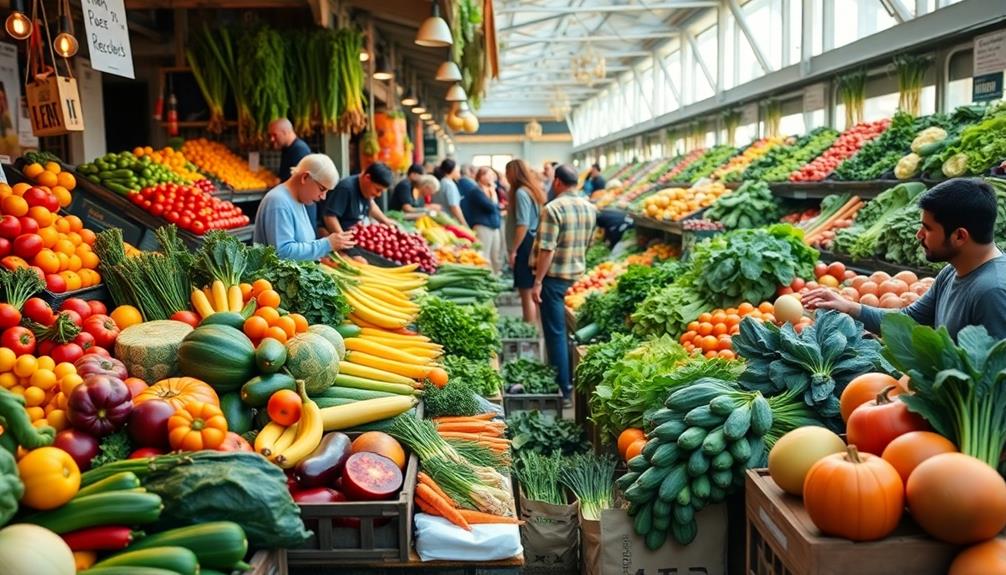
As the conversation around health benefits continues, consumer preferences are shifting considerably towards organic produce. You're likely noticing a surge in organic food sales, which hit $45.2 billion in 2017, with fruits and vegetables making up a significant $16.5 billion of that total. This trend indicates that you're prioritizing fresh, unprocessed options over conventional processed foods. Dishes featuring fresh ingredients, like Mushroom Masala, are becoming increasingly popular among health-conscious consumers. Furthermore, the growing interest in organic produce is also driven by the desire for sustainable and environmentally-friendly food options. Consumers are increasingly aware of the impact of their dietary choices on the planet, leading to a greater demand for organic and locally-sourced products. In addition to the health and environmental benefits, the science behind truffle pricing is also contributing to the popularity of dishes like Mushroom Masala, as consumers become more knowledgeable about the value of premium ingredients in their meals.
Many health-conscious consumers, often well-educated females, are driving this shift. They're increasingly aware of the health implications associated with pesticide residues in conventional produce, which has prompted some low-income consumers to contemplate reducing their fruit and vegetable intake. The concern over these residues highlights how health concerns impact dietary choices.
Moreover, the global organic marketplace is booming, valued at approximately $92 billion annually, with a notable 14.7% increase in organic farmland from 2014 to 2015. This growing demand for organic fruits and vegetables reflects a broader trend towards healthier lifestyles.
As you navigate your food choices, it's clear that the preference for organic options is rooted in a desire for better health and quality in food production.
Environmental Impact Considerations
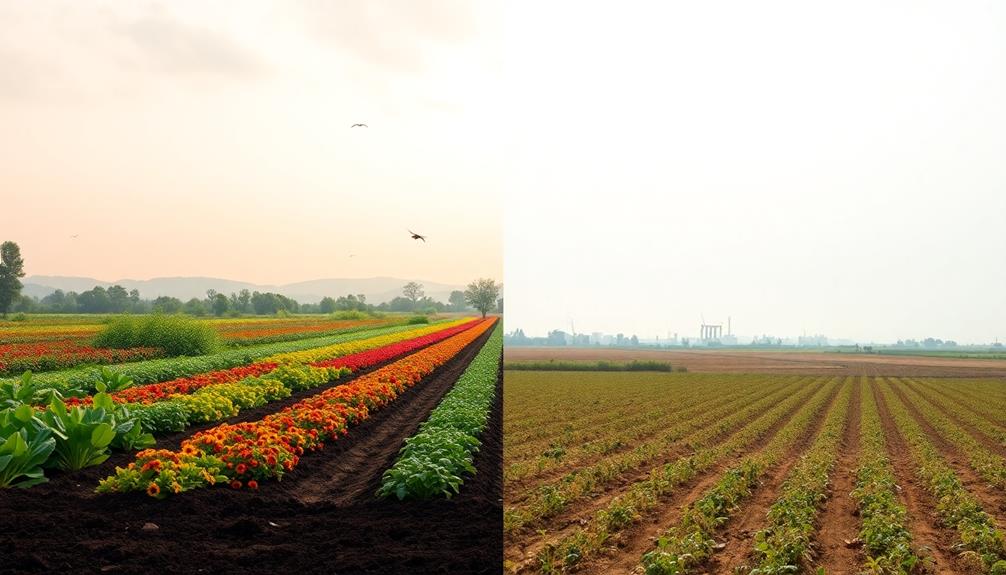
The environmental impact of your food choices plays an essential role in the broader discussion of organic versus conventional produce. Organic farming practices focus on enhancing soil health, conserving water, and promoting biodiversity, which leads to a healthier ecosystem. Additionally, many traditional dishes, like Red-Braised Pork Belly, often incorporate locally sourced organic ingredients, highlighting the connection between sustainable farming and cultural cuisine.
In contrast, conventional farming methods often rely on synthetic fertilizers and pesticides, contributing to soil degradation and increased pesticide exposure.
Consider these important factors:
- Organic practices can considerably reduce chemical runoff, protecting surrounding water bodies and wildlife habitats.
- Crop rotation and natural pest management in organic farming maintain ecological balance and help prevent pest resistance.
- Organic methods enhance carbon sequestration in soil, aiding in climate change mitigation.
The reliance on chemical inputs in conventional agriculture can harm soil microorganisms essential for soil health, while organic methods foster sustainable soil management.
By choosing organic produce, you support practices that minimize negative environmental impacts and promote biodiversity.
Ultimately, your food choices can contribute to a more sustainable future, balancing agricultural needs with ecological integrity.
Navigating Misleading Labels
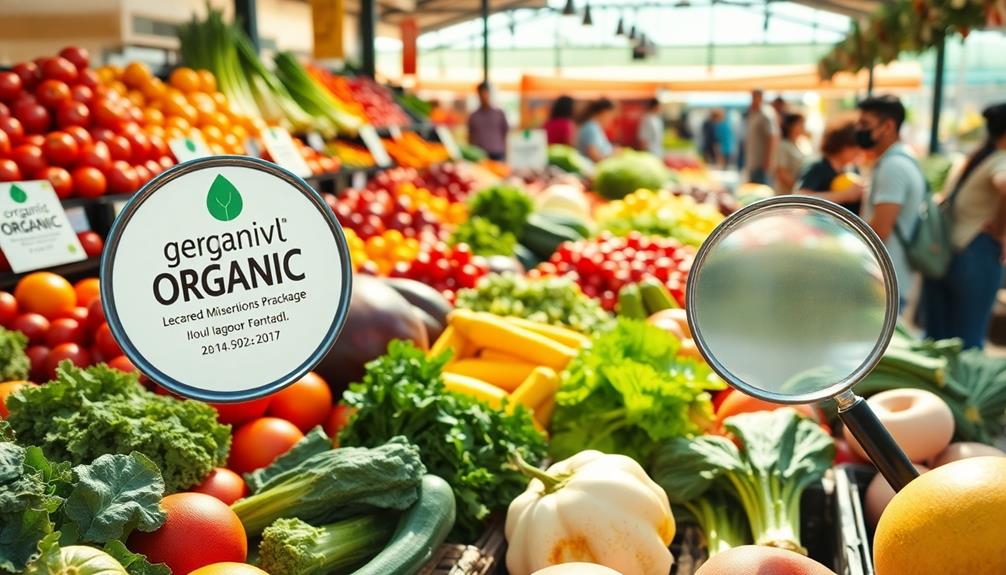
Finding your way through the maze of food labels can be tricky, especially when terms like "natural" and "free-range" appear to promise healthier options. While "natural" suggests the absence of artificial colors or preservatives, it doesn't guarantee that the product is organic. In fact, it may still contain synthetic pesticides and fertilizers.
To guarantee you're choosing organic, look for the USDA Organic seal, which confirms that a product meets strict standards and is at least 95% organic. Additionally, understanding the nuances of culinary traditions from around the world can enhance your appreciation of organic produce, as different cultures emphasize fresh ingredients in their cooking.
Misleading labels can further complicate your shopping experience. Terms like "hormone-free" or "free-range" might sound appealing, but they often relate to conventional farming practices and lack the rigorous certification required for organic products. This inconsistency can leave consumers confused about what they're really purchasing.
Educating yourself about these labeling practices is essential. Understanding the differences between organic and conventional farming can empower you to make informed choices that align with your values.
Always keep an eye out for the USDA Organic certification to avoid falling for misleading claims and to guarantee you're getting the quality you desire in your produce.
Frequently Asked Questions
Is Organic Food Really Better Than Conventional?
You might wonder if organic food's really better. While it often has fewer pesticides and some nutrient differences, the health benefits aren't always clear-cut. Consider your budget and personal preferences when making your choice.
What Is the Truth About Organic Produce?
You might think organic produce guarantees better nutrition, but the truth is it often isn't markedly different from conventional options. Organic farming can reduce pesticide exposure, but focusing on a diverse diet is what's really important.
Does Buying Organic Really Make a Difference?
Buying organic can make a difference in pesticide exposure, but the nutritional benefits aren't significant. If you're concerned about chemicals, focus on the "Dirty Dozen" and balance your budget when choosing between options.
What Are the Disadvantages of Buying Organic Produce?
You'd think buying organic guarantees quality, but it often strains your wallet and limits choices. Plus, misleading labels can trick you, and farming methods might not yield safer produce. Sometimes, conventional's just as good.
Conclusion
In the end, whether you're clutching a pristine organic apple or a conventional one, you're still just one bite away from the same crunchy truth: your choice might be more about marketing than miracles. So, as you stroll the aisles, remember—you're not just buying food; you're supporting a lifestyle. Who needs a PhD in agriculture when you can simply pay extra for the label? After all, nothing says "health nut" quite like a $5 head of lettuce!



